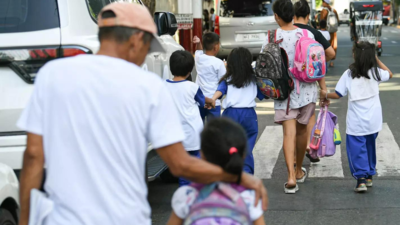- News
- India News
- 19k kids in shelter homes, Tamil Nadu tops list with 1.5k: Govt to SC
Trending
19k kids in shelter homes, Tamil Nadu tops list with 1.5k: Govt to SC
Union government has apprised the Supreme Court of the distressing reality that 18,807 orphaned, abandoned, and surrendered children are currently in limbo for adoption within child care institutions (CCIs) throughout India. Among them, approximately 8,800 children face the heartbreaking circumstance of lacking any visitation from their parents. In Nov, the court tasked additional solicitor general with the personal oversight of compiling comprehensive data.

Nearly 8,800 children have no visitation from their parents (Representative Image/AFP)
NEW DELHI: Reflecting a tragic side of society, Union govt has informed Supreme Court that 18,807 orphaned, abandoned and surrendered children are awaiting adoption in child care institutions (CCIs) across India of which nearly 8,800 children have no visitation from their parents.
In Nov, the court had asked additional solicitor general Aishwarya Bhati to personally ensure compilation of data on children lodged in CCIs in every district.After compilation of the data, the Centre in its affidavit told the SC that Tamil Nadu CCIs housed the largest number of such children at 1,541, followed by Jammu and Kashmir (1,035), Maharashtra (1,007), Uttar Pradesh (850), Odisha (809), Rajasthan (685), and West Bengal (423).
A question before the SC, which is attempting to speed up and smoothen the abysmally slow and complicated adoption process under Central Adoption Resource Authority (CARA), is whether adoptions under the Hindu Adoption and Maintenance Act (HAMA) can be brought under the supervision of CARA, which at present monitors adoptions under the Juvenile Justice (Care and Protection of Children) Act.
Opposing the oft-repeated suggestion from Piyush Saxena of NGO 'The Temple of Healing', the Centre said, "HAMA and JJ Act are separate legal frameworks governing adoption. While HAMA is a personal law, JJ Act is a secular and progressive law. HAMA specifically deals with adoption within the Hindu community and provides guidelines and procedures for Hindu families wishing to adopt.
It further said, "Prevalence of open and direct adoptions under HAMA is indeed common, especially between known couples, whether they are relatives or otherwise. While these adoptions may not require extensive formalities, they can lead to legal complications, particularly concerning property rights or succession rights within the family. Challenges often arise when such adoptions are contested in courts, especially if there are no registered documents to substantiate the adoption." It said HAMA and JJ Act operated independently of each other and catered to different contexts and populations.
In the last three years, between 2021 and 2024, there were 10,875 adoptions under JJ Act, while those under HAMA during the same period was 19,424, the Centre said.
In Nov, the court had asked additional solicitor general Aishwarya Bhati to personally ensure compilation of data on children lodged in CCIs in every district.After compilation of the data, the Centre in its affidavit told the SC that Tamil Nadu CCIs housed the largest number of such children at 1,541, followed by Jammu and Kashmir (1,035), Maharashtra (1,007), Uttar Pradesh (850), Odisha (809), Rajasthan (685), and West Bengal (423).
A question before the SC, which is attempting to speed up and smoothen the abysmally slow and complicated adoption process under Central Adoption Resource Authority (CARA), is whether adoptions under the Hindu Adoption and Maintenance Act (HAMA) can be brought under the supervision of CARA, which at present monitors adoptions under the Juvenile Justice (Care and Protection of Children) Act.
Opposing the oft-repeated suggestion from Piyush Saxena of NGO 'The Temple of Healing', the Centre said, "HAMA and JJ Act are separate legal frameworks governing adoption. While HAMA is a personal law, JJ Act is a secular and progressive law. HAMA specifically deals with adoption within the Hindu community and provides guidelines and procedures for Hindu families wishing to adopt.
"While HAMA governs adoption within the Hindu community, JJ Act applies to all children, irrespective of their religion or background, who are in need of care and protection. The adoption process under JJ Act involves stringent procedures to ensure the best interests of the child, including assessment, matching and follow-up procedures conducted by adoption agencies under the Act."
It further said, "Prevalence of open and direct adoptions under HAMA is indeed common, especially between known couples, whether they are relatives or otherwise. While these adoptions may not require extensive formalities, they can lead to legal complications, particularly concerning property rights or succession rights within the family. Challenges often arise when such adoptions are contested in courts, especially if there are no registered documents to substantiate the adoption." It said HAMA and JJ Act operated independently of each other and catered to different contexts and populations.
In the last three years, between 2021 and 2024, there were 10,875 adoptions under JJ Act, while those under HAMA during the same period was 19,424, the Centre said.
End of Article
FOLLOW US ON SOCIAL MEDIA










